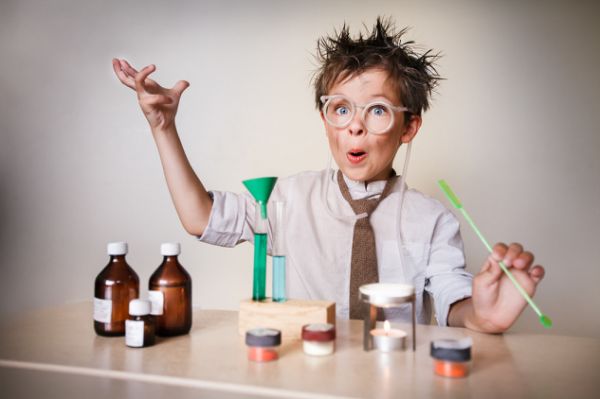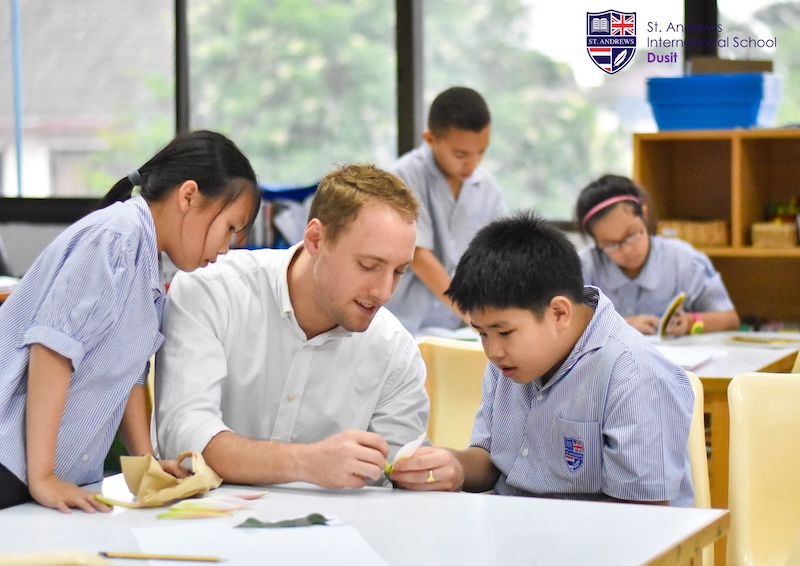Have you noticed how your child seems to play a different way as they grow older? In this article, Dr Blakemore from Bangkok Prep explains the different stages and types of play and what benefits they can offer.
By Dr Lynn Blakemore
The concept of play can be difficult to define and we all have our perceptions of what play can, and should, look like. These perceptions would have been shaped and determined by our recollections of childhood and play opportunities, but what cannot be underestimated is the importance of play in a child’s development.
Value of Play
Play is integral to supporting a child’s holistic development. The term ‘holistic’ refers to physical, cognitive, emotional, and social areas of growth. Play is the most intuitive way that babies and young children learn and it is crucial in laying the foundations for healthy brain development. Play is a ‘child’s language’ and it’s how children naturally interact with and explore the world around them.
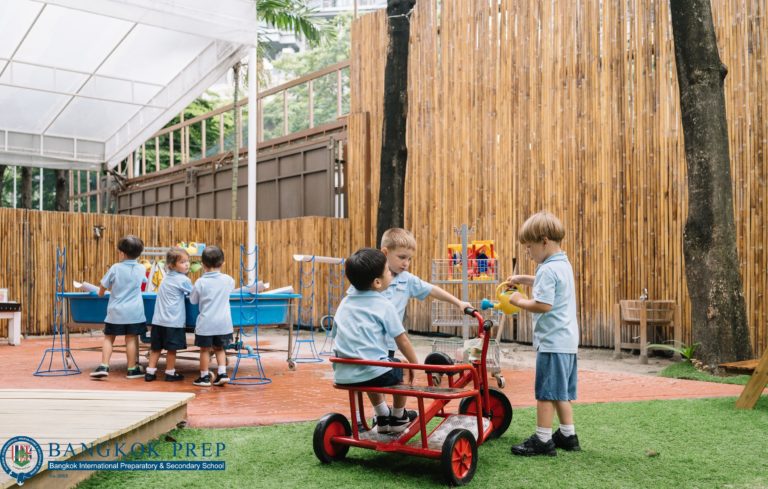
Stages of Play
As children develop, their play evolves too. And although all types of play can occur at any stage of development, particular behaviours are associated with specific age groups. The following are adapted from Mildred Parten, an early advocate for the benefits of playing.
Solitary play (3-18 months old approximately) In this first stage of development, children tend to play alone or possibly with adults, with very little interest in interacting with children of their same age. They can be interested in cause-and-effect games, such as peek-a-boo and toys that meet their sensory needs, including those that spin, light up, and make sounds. Toys that they can explore orally (place in their mouth) are also key to this stage of development.
Parallel play (18-36 months of age approximately) In this stage, children can play alongside one another and might be playing with the same toy or activity, yet show minimal ability or desire to interact with their peers. This stage of play is when children begin to understand that simple play, such as passing a ball or toy car back and forth, can be enjoyed by multiple people at the same time.
Symbolic play (3-4 years of age approximately) This stage of play involves the use of inanimate objects to represent real-life activities, such as pretending that a stick is a sword or a banana is a mobile phone! At this stage, children often become more interested in other children rather than with their toys. This can be referred to as Associative Play and can support the development of skills such as language development, problem solving, sharing, and starting to work together with similar shared goals.
Cooperative play (4 years and beyond) This is the most advanced stage of play and is where children develop more complex storylines to support and lead their play. You may see children creating dens to support their superhero play, combining shopping and cooking activities in a play kitchen, and playing ‘families’ in a home corner. Children in this stage of development are interacting with other children and learning social rules and conventions, such as turn-taking and sharing. As a result, children of this age are more able to play and understand the concepts of simple board games and other games with rules, such as hide-and-seek and Simon Says.
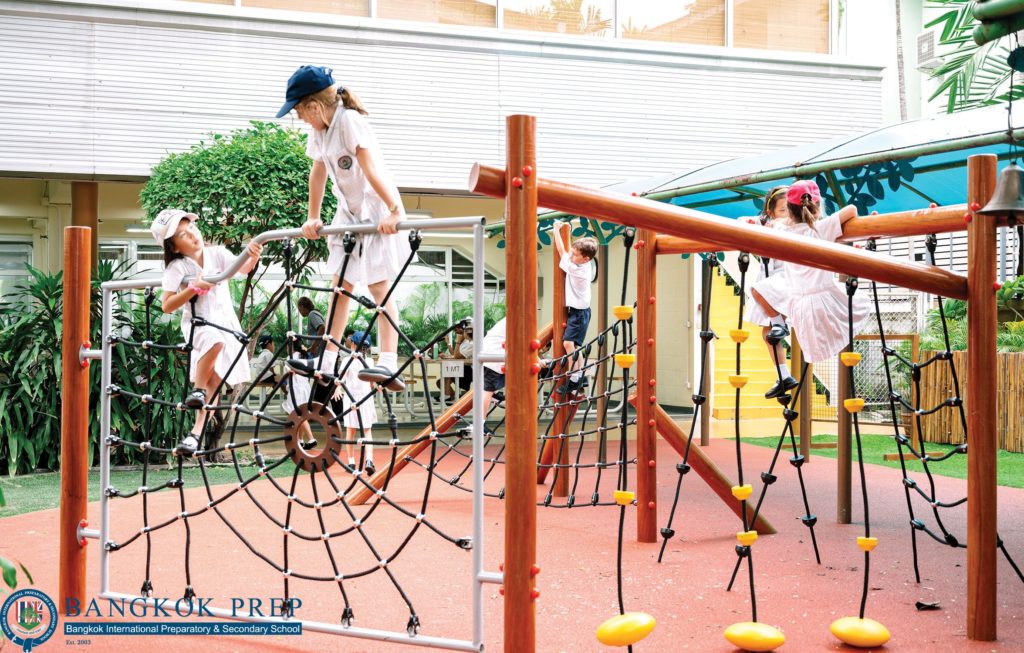
In line with the different stages of play, there are also different types of play that have been categorised into different areas (the list here is offered as a general guide but is not exhaustive).
Sensory play This type of play should involve activities that stimulate our senses, which include, movement, balance, sight, hearing, touch, smell, and taste. Children need to engage in sensory play as it supports a child’s natural curiosity to explore and investigate the world around them (early scientific skills).
Constructive play Constructive play offers children the opportunity to build and create things. For example, a baby will take great joy in knocking over blocks that are created for them and then possibly explore an individual block using their senses (often orally). A two-year-old engaged in constructive play becomes more complex as they start to stack items on top of each other, such as blocks, stacking toys, or natural resources. During this type of play, children are developing important skills such as problem solving. They may also be exposed to concepts such as numbers and shapes and develop their social skills through turn-taking and working together.
Expressive play Expressive play can involve music, dance, art, and writing activities — all of which offer opportunities for children to express their feelings and emotions in ways that support their developmental stage. In role play, or fantasy play, children can use their imagination in ways that aren’t limited by their everyday experiences. They can create new roles and language, without real-world restraints, which in turn, can support a child’s emotional development by helping children to express themselves and make sense of the world around them.
Physical play Physical motor skills are categorised into two groups: gross and fine. Gross motor skills include the larger movements of our bodies, such as running, jumping, skipping, or crawling. Activities to support this area of development can be achieved through climbing, balancing, obstacle courses, and generally just space to explore all of these movements. Fine motor skills are the smaller movements that we develop, such as grasping an object, undoing buttons, holding a pencil, and also include the movement of our lips and tongue. Activities to strengthen a child’s fine motor skills can include, play dough, sponge painting, water play (syringes and sprays), and gardening.
TOP TIP For Play!
To support your child’s holistic development, it is important to allow children to engage in all of these different types of play. You are your child’s main advocate for fun, so delay those chores on your to-do list and make time to play!
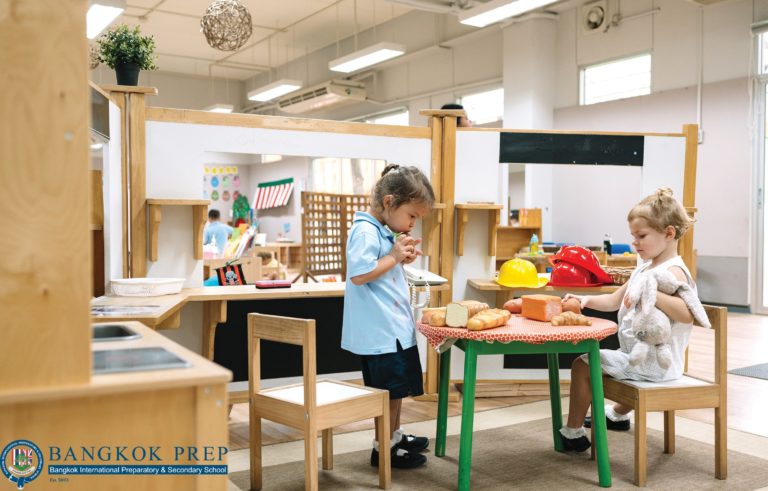
References:
Parten, M.B. (1932). Social participation among pre-school children. Journal of Abnormal and Social Psychology, 27(3), 243-269.
Dr. Lynn Blakemore is the Lead Nursery Teacher at Bangkok International Preparatory and Secondary School. She has an EdD Doctorate in Early Childhood Education (University of Sheffield, UK) and over 30 years of experience teaching and working with children and young people in the UK, Jersey, and Thailand. With a passion for Early Years, Dr. Blakemore is an advocate for promoting children’s rights, which includes their right to play.
OUR CAMPUSES
PRIMARY CAMPUS
BANGKOK PREP PRIMARY CAMPUS
23 SUKHUMVIT 53, VADHANA
BANGKOK, 10110
SECONDARY CAMPUS
BANGKOK PREP SECONDARY CAMPUS
77 SUKHUMVIT 77, VADHANA
BANGKOK, 1011002-700-5858











